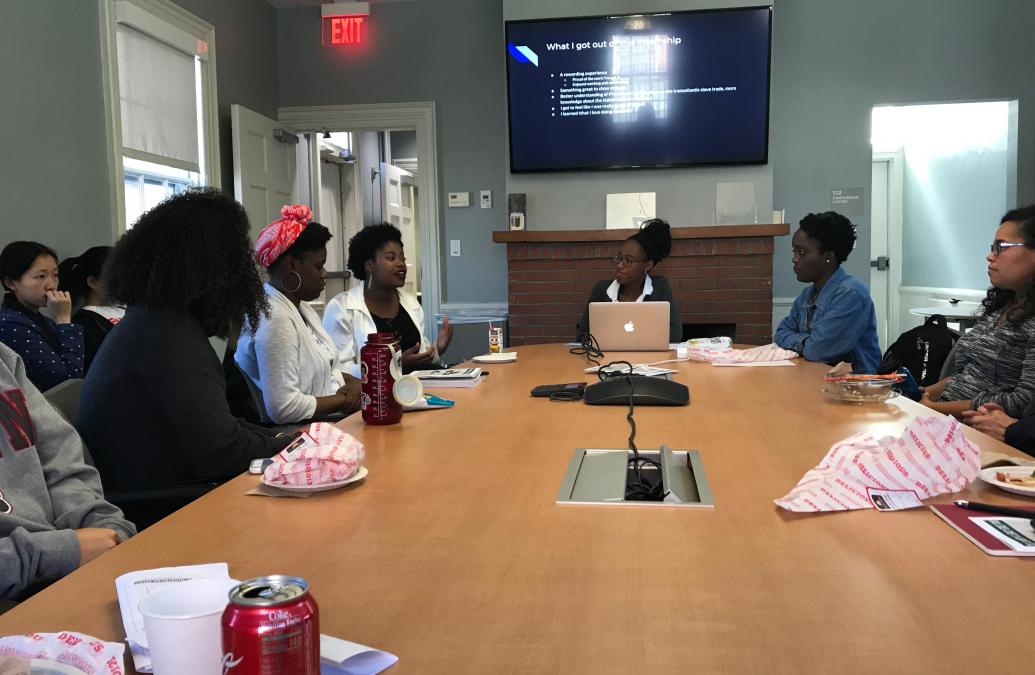Royce Fellows Partner with Sophia Academy Alumni, Offering Mentorship and College Access Support

On Dec. 6 2017, a group of high school juniors from schools across Rhode Island gathered in the Stephen Robert ‘62 Campus Center (Faunce), overlooking the Main Green, to meet with Vernicia Elie, Assistant Dean for Financial Advising at Brown. The students are all graduates of Sophia Academy Middle School, an independent all-girls school serving low-income students color, and are currently navigating the complex process of college, scholarship and financial aid applications.
Brown undergraduates Attayah Douglas ’18 and Mursal Gardezi ‘18 co-organized the meeting with Dean Elie for the students as part of the partnership between Sophia Academy and the Royce Fellowship at the Swearer Center so that the Sophia Academy alumni could receive necessary help with the college application process that they may not be getting from their high schools.
“It’s a very systemic problem,” Douglas, an education concerator, said in an interview. Douglas also co-coordinates the Brown-Sophia Royce Research Collaborative with Mursal. “Many of the [high] schools our students attend are understaffed and overcrowded, making it difficult to give each student one-on-one guidance. When they do receive guidance from counselors or teachers, they often encounter implicit or even explicit bias—they’re cautioned to rethink applying to the highly selective schools they want to attend.”
One of the main goals of the collaboration between Sophia Academy and the Royce Fellowship, which is currently in its third year, is to provide an encouraging space for the students facing these challenges. Douglas says that she and the other mentors had similar experiences when applying for college and can offer first-hand advice and support to the high schoolers.
“College counselors and teachers told us that what we were doing was too ambitious because of who we are, where we came from, or what our grades were,” Douglas said. “It’s really important that we tell the students that we’re here because of the people that came before us, and that now that we are here, we want to give them the tools to be here, too.”
The partnership was initiated in 2015 by the head of Sophia Academy, Gigi DiBello, and then-director of the Royce Fellowship, Kerri Heffernan (who now serves as the Director of the Global Sport Leadership Initiative at the Swearer Center). Their goal was to give alumni of Sophia Academy, juniors and seniors in high school, access to college readiness support from women of color mentors at Brown and exposure to research opportunities with the aid of women of color faculty, who would create summer research internships for the students. Two Royce Fellows, Jamelle Watson-Daniels B’15 and Nimesha Gerlus B’16, took the opportunity to pilot the program as co-coordinators.
Between 10 and 11 Sophia Academy alumni have participated in the program every year since. The students meet as a full group with Brown undergraduate women mentors once a month and meet one-on-one with mentors as well.
As part of the program, the students develop proposals for independent research projects, similar to the development of proposals for Brown undergraduates’ Royce Fellowships, and some receive funding from Sophia Academy to execute their proposals over the summer. In the program’s first year, one student worked at the Child Asthma Research Program at Hasbro under the supervision of Brown professor Sheryl Kopel. In 2017, two students participated in the 6-week summer research partnership.
Taiwo Demola, a senior at Classical High School, conducted research on significant historic and contemporary sites connected to the transatlantic slave trade in the city of Providence in order to propose a location for a slavery memorial. Maya Clifton, a senior at Lincoln School, researched streets in College Hill and their connection to the transatlantic slave trade in order to develop a Slavery & Legacy walking tour.
Mursal began working with the program after completing her own research as a Royce Fellow. She believes that the Royce Fellowship’s emphasis on independent research is a crucial part of the mentorship program, too: “These are independent projects that professors might not necessarily back as part of their lab, which means that you get to be really responsible in developing and carrying through an idea that’s completely yours.”
The student mentors hope that they can one day work to find additional funding to expand the program to serve more high school students. But for now, their main priority is continuing to cultivate as supportive a community as possible.
“It’s so inspiring when the girls start to conceive of the all the things they can do that they never thought were possible,” Douglas said. “They say things like, ‘I’ve never thought of myself as a researcher,’ or ‘I didn’t think my interest in science or medicine would translate into a research project,’ or ‘I didn’t know I could have access to a space like this.’ It’s really easy to entertain self-doubt when you’re not exposed to opportunities or a space that shows you all the different pathways. But once they are, they start seeing all the different ways they can grow.”
